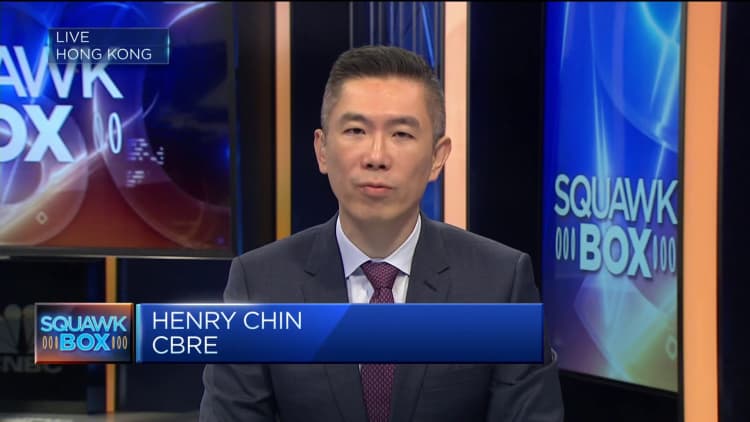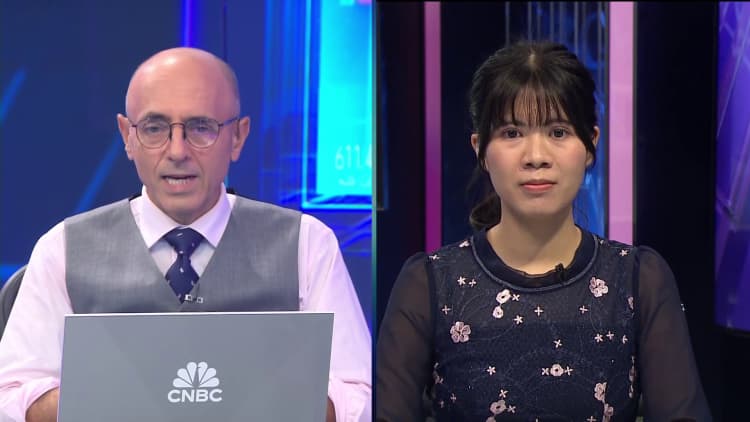Aerial photo shows a rural residential area in Chengdong town of Hai ‘an City, East China’s Jiangsu Province, April 1, 2023.
Future Publishing | Future Publishing | Getty Images
China’s real estate troubles are accelerating. Prospective home buyers are holding back on making purchases, leading to weak sales that compound the urgent need for policymakers to step up support for the industry.
New home sales for the top 100 developers dropped by about a third in June and July from a year ago, after double-digit growth earlier in the year, said Edward Chan, a director at S&P Global Ratings. With most apartments in China sold before they are completed, weak new home sales will likely lead to significant cash flow issues for developers.
“We think the situation is probably getting a little bit worse because of this Country Garden incident,” Chan told CNBC in a phone interview Thursday. He added he hasn’t seen any improvement in new home sales so far.
At a time when rafts of data are pointing to a rapidly slowing economy, this lack of improvement, along with Country Garden‘s looming default, is making it more difficult for property developers to raise funds.
Late Thursday in the U.S., the world’s most indebted property developer Evergrande filed for bankruptcy protection, further shaking up investor confidence.
The deepening crisis of confidence is adding to pressure on the world’s second-largest economy.

The debt troubles at Country Garden and the uncertainty of government support are feeding into broader unease in the Chinese housing market.
Louise Loo
Oxford Economics
The Chinese property sector has been reeling since 2020, when Beijing cracked down on the debt levels of mainland property developers.
Years of exuberant growth led to the construction of ghost towns where supply outstripped demand as developers looked to capitalize on the desire for home ownership and property investment.
These measures, known as China’s “three red lines” policy, point to three specific balance sheet conditions developers must meet if they want to take on more debt.
The rules require developers to limit their debt in relation to the company’s cash flow, assets and capital levels, with highly indebted developer Evergrande the first headline-grabbing default in late 2021.
Country Garden’s woes
A default by Country Garden could add $9.9 billion to the year-to-date global emerging markets high-yield corporate default tally, taking the total default volume for the Chinese property sector to $17 billion to-date in 2023, JPMorgan said in a note dated Aug. 15.
The U.S. investment bank expects China property to account for nearly 40% of all emerging market default volumes in 2023.
Much of Country Garden’s problems have to do with its outsized exposure to less developed parts of China known as lower-tier cities. About 61% of developments, according to the company’s 2022 annual report, are in these lower-tiered cities, where housing supply outstrips demand.

“Country Garden sales performance has been kind of disastrous,” S&P Global’s Chan said, noting that sales in June and July dropped by about 50% year-on-year.
Chan said that lower-tier cities started to see sales weakness in May, while higher-tier cities started to see sales worsen in subsequent months.
As a result of Country Garden’s troubles, Chan said it’s “becoming more and more challenging” for China’s overall real estate sales to reach S&P’s base case of 12 trillion yuan to 13 trillion yuan this year.
“Instead of an L-shape it could be a descending staircase,” he said.
Chan said S&P’s bear case for China’s property sector is for 11 trillion yuan in sales this year, and 10 trillion yuan for 2024.
That’s still only nearly half of what the country’s real estate market sales were at its peak 2021 — at 18 trillion yuan, according to figures Chan shared.
At their mid-year economic review meeting in July, China’s top leaders vowed to “adjust and optimize policies in a timely manner” for its beleaguered property sector.
To date, they have yet to clearly demonstrate their plan to adapt to “major changes” in the demand-supply dynamics in the property market.
“The debt troubles at Country Garden and the uncertainty of government support are feeding into broader unease in the Chinese housing market,” Louise Loo, lead economist at Oxford Economics, wrote in a note dated Aug. 11.
Land sales divergence
As China’s property sector consolidates amid the debt and credit malaise, state-owned developers are better positioned to grow than non-state ones.
State-owned developers saw contracted sales grow by 48% in the first seven months of this year from a year ago, while developers that were not state-owned saw sales fall by 19%, according to data from Natixis Corporate and Investment Banking.
This is enhancing state-owned developers’ ability to buy land from local governments since robust home sales are boosting their cash flow.
“Nowadays, 87% of the land purchases are by [state-owned enterprises], so how do you expect [privately owned enterprises] to grow further?” Gary Ng, a senior economist at Natixis, said in a phone interview Tuesday.

For this year through July, 87% of land purchases by value were by state-owned developers, similar to last year, Natixis data showed. That’s up sharply from 59% in 2021, the data showed.
Ng expects state-owned developers to have greater ownership in China’s real estate market going forward. But he said that while non-state-owned developers have had leverage problems in the past, having so many state-owned developers in the industry might make it more difficult to forecast actual demand.
Still, underlying housing demand in first-tier cities remains somewhat resilient and untapped, and may be unleashed once there’s greater policy clarity.
“Timely policy in stabilizing the demand and sales in the higher-tier cities would be very important,” said Chan from S&P Global.
“If that could be achieved then over time, the stabilization could be spilled over to the lower-tier cities. But that will take an even longer time.”

